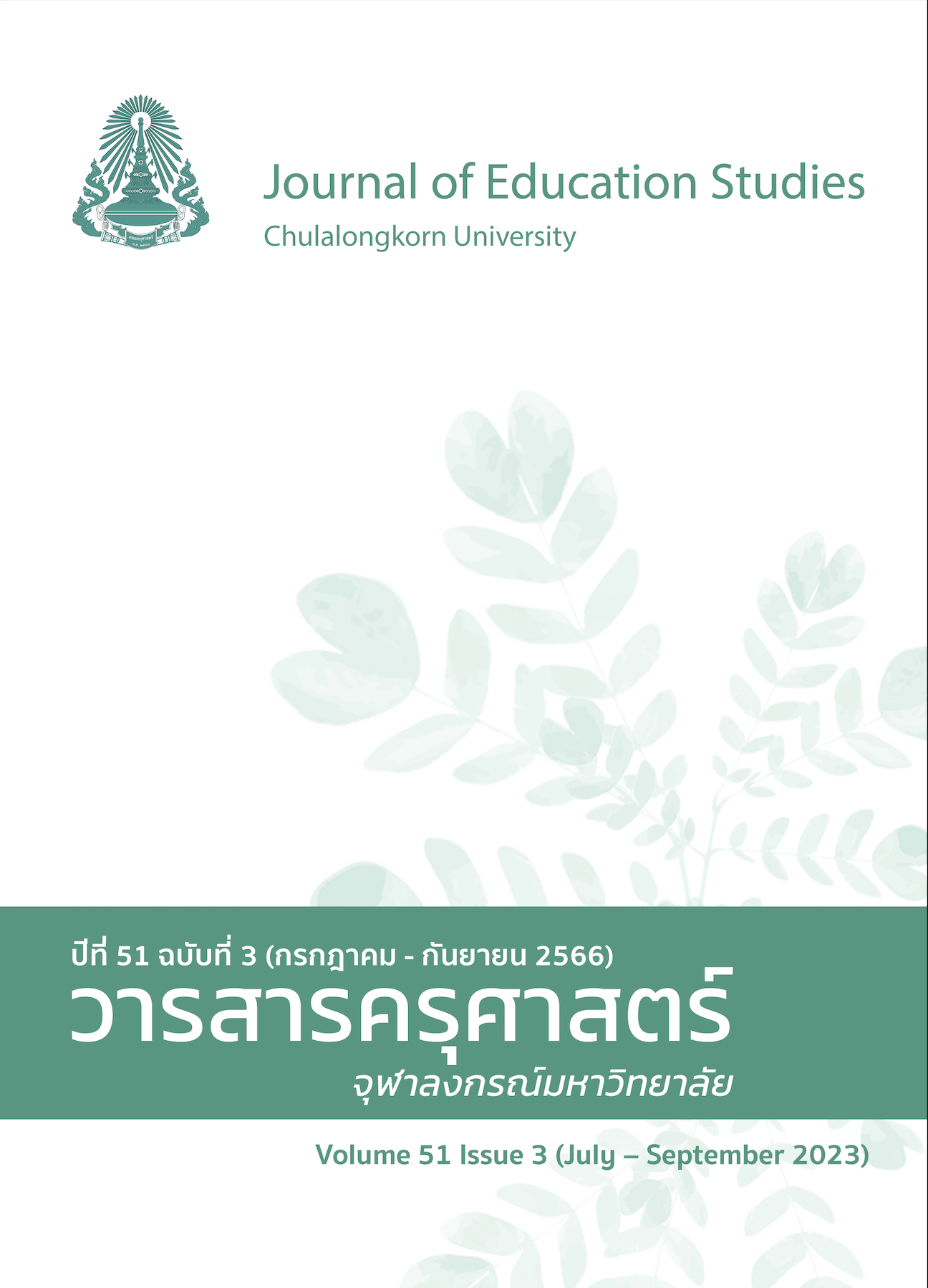Science Teacher Conceptions in Socio-scientific Issues and Science Learning Management during the COVID-19 Pandemic
DOI:
https://doi.org/10.14456/educu.2023.26Keywords:
Concepts, teacher, science, socio-scientific issues, COVID-19, ConceptsAbstract
This qualitative research aimed to investigate the science teachers’ conceptions in socio-scientific issues and how they use these concepts in science learning during the COVID-19 pandemic. The researcher used interpretative ethnography method according to 3 research instruments: a semi-structured interview, an audio recording and a questionnaire. The participants were 9 in-service teachers from a science teacher community in a school. The findings indicated there was more than 50% of teachers that had correct concepts and were able to manage learning by using socio-scientific issues. However, the researchers could distinguish 9 teachers into 4 groups as follows; group 1) who can understand correct/complete concepts and are able to operate learning management (3 subjects), group, 2) who understand incorrect/incomplete concepts but are able to operate learning management (2 subjects), group, 3) who can understand correct/complete concepts but have never operate learning management (3 subjects) and group, 4) who understand incorrect/incomplete concepts and has never operated learning management (1 subjects). Moreover, there were only 2 of the teachers left those still operated learning management by using socio-scientific issues during the pandemic of COVID-19.
References
กนกเทพ เมืองสง, คณิติณ ช่างเขียน, กัลยา กินกิ่ง, และ พงศ์ประพันธ์ พงษ์โสภณ. (2563). การตรวจสอบวรรณกรรมอย่างเป็นระบบและการสังเคราะห์งานวิจัย เรื่อง การพัฒนาการให้เหตผุลเชิงจริยธรรมด้วยการสอนวิทยาศาสตร์ โดยใช้ประเด็นทางสังคมที่เกี่ยวเนื่องกับวิทยาศาสตร์. วารสารศึกษาศาสตร์ มหาวิทยาลัยสุโขทัยธรรมาธิราช. 13(2), 17.
กีรติกา อินทร์ชัย, นพมณี เชื้อวัชรินทร์, เชษฐ์ ศิริสวัสดิ์, และ มันทนา เมฆิยานนท์. (2564). การวิจัยเชิงปฏิบัติการในการจัดการเรียนรู้โดยใช้ประเด็นทางสังคมที่เกี่ยวเนื่องกับวิทยาศาตร์ที่มีต่อผลสัมฤทธิ์ทางการเรียนและการคิดอย่างมีวิจารณญาณ. วารสารวิชาการศึกษาศาสตร์ ศรีนครินทรวิโรฒ. 22(2), 1-18.
ณัฐวรรณ ศิริธร และ เอกภูมิ จันทรขันตี. (2562). การจัดการเรียนรู้แบบสืบเสาะที่ขับเคลื่อนด้วยกลวิธีการโต้แย้งเพื่อพัฒนาความสามารถในการสร้างคำอธิบายเชิงวิทยาศาสตร์ ของนักเรียนชั้นมัธยมศึกษาปีที่ 4 เรื่อง แรง มวล และกฎการเคลื่อนที่. วารสารมหาวิทยาลัยศิลปากร. 19(1), 130.
ณัฐวัตร อ้ายแก้ว. (2563). การพัฒนาทักษะการโต้แย้งทางวิทยาศาสตร์ของนักเรียนชั้นมัธยมศึกษาปีที่ 6 ที่ได้รับการจัดการเรียนรู้โดยใช้ประเด็นสังคมที่เกี่ยวข้องกับวิทยาศาสตร์. วิทยานิพนธ์ปริญญาการศึกษามหาบัณฑิต สาขาวิชาการสอนวิทยาศาสตร์และคณิตศาสตร์ คณะศึกษาศาสตร์ มหาวิทยาลัยมหาสารคาม. 18.
ประสาท เนืองเฉลิม. (2551). การเรียนการสอนวิทยาศาสตร์ตามแนวคิด Socioscientific. วารสารศึกษาศาสตร์ มหาวิทยาลัยมหาสารคาม. 2(3), 99–106.
พิชญา ศิลาม่อม และ ฤดีรัตน์ ชุษณะโชติ. (2562). ผลการเรียนรู้โดยใช้ประเด็นทางสังคมที่เกี่ยวเนื่องกับวิทยาศาสตร์เป็นฐานที่มีต่อความสามารถในการให้เหตุผลเชิงวิทยาศาสตร์ของนักเรียนมัธยมศึกษาตอนต้น. วารสารวิชาการครุศาสตร์อุตสาหกรรม พระจอมเกล้าพระนครเหนือ. 10(3), 105.
ภัณฑิลา แย้มพยุง. (2562). การจัดการเรียนรู้ด้วยประเด็นทางสังคมที่เกี่ยวข้องกับวิทยาศาสตร์ผนวกการสะท้อนคิดผ่านเครือข่ายสังคมออนไลน์ เพื่อส่งเสริมความสามารถในการตัดสินใจประเด็นทางสังคมที่เกี่ยวข้องกับวิทยาศาสตร์ เรื่อง มนุษย์กับสิ่งแวดล้อม สำหรับนักเรียนชั้นมัธยมศึกษาปีที่ 6. การค้นคว้าอิสระปริญญาการศึกษามหาบัณฑิต สาขาวิชาวิทยาศาสตร์ศึกษา คณะศึกษาศาสตร์ มหาวิทยาลัยนเรศวร. 130.
สำนักงานเลขาธิการสภาการศึกษา. (2560). แผนการศึกษาแห่งชาติ พ.ศ. 2560-2579. กระทรวงศึกษาธิการ. 67.
อลิษา รัชนิพนธ์, ดวงเดือน สุวรรณจินดา, และ นวลจิตต์ เชาวกีรติพงศ์. (2564). ผลของการจัดการเรียนรู้โดยใช้ประเด็นทางสังคมที่เกี่ยวเนื่องกับวิทยาศาสตร์ เรื่อง การถ่ายทอดลักษณะทางพันธุกรรมที่มีต่อผลสัมฤทธิ์ทางการเรียนวิทยาศาสตร์และความสามารถในการให้เหตุผลเชิงวิทยาศาสตร์ของนักเรียนชั้นมัธยมศึกษาปีที่ 3 โรงเรียนเกาะสิเหร่ จังหวัดภูเก็ต. วารสารศึกษาศาสตร์ มหาวิทยาลัยทักษิณ. 21(2), 110-123.
Plummer, L., Kaygisiz, B.B., Kuehner, C.P., Gore, S., Mercuro, R., Chatiwala, N., & Naidoo, K. (2021). Teaching Online during the COVID-19 Pandemic: A Phenomenological Study of Physical Therapist Faculty in Brazil, Cyprus, and The United States. Education Sciences. 11, 130.
Norman, K. D. (1997). Interpretive ethnography: ethnographic practices for the 21st century (1st ed.). Sage publications, Inc.
Ratckiffe, D. N., & Grace, M. (2003). Science education for citizenship: Teaching socioscientific issues. Maidenhead: Open University.
Sadler, T. D. (2004). Informal reasoning regarding socio-scientific issues: A critical review of research. Journal of Research in Science Teaching. 41, 513-536.
Sadler, T. D., & Zeidler, D. L. (2004). The morality of socio-scientific issues: Construal and resolution of genetic engineering dilemmas. Science Education. 88, 4-27.
Schwartz, P. L., & Webb, G. (2002). Assessment case studies, experience and practice from higher education. London: Kogan Page.
Wilmes, S., & Howarth, J. (2009). Using issues-based science in the classroom. Journal of The Science Teacher; Washington. 76(7), 24-29.
Zeidler, D.L., & Nichols, B. (2009). Socioscientific issues: Theory and practice. Journal of Elementary Science Education. 21(2), 49–58.
Zeidler, D.L., Sadler, T.D., Applebaum, S., & Callahan, B.E. (2009). Advancing reflective judgement through socio-scientific issues. Journal of Research in Science Teaching.
Downloads
Published
How to Cite
Issue
Section
License

This work is licensed under a Creative Commons Attribution-NonCommercial-NoDerivatives 4.0 International License.




